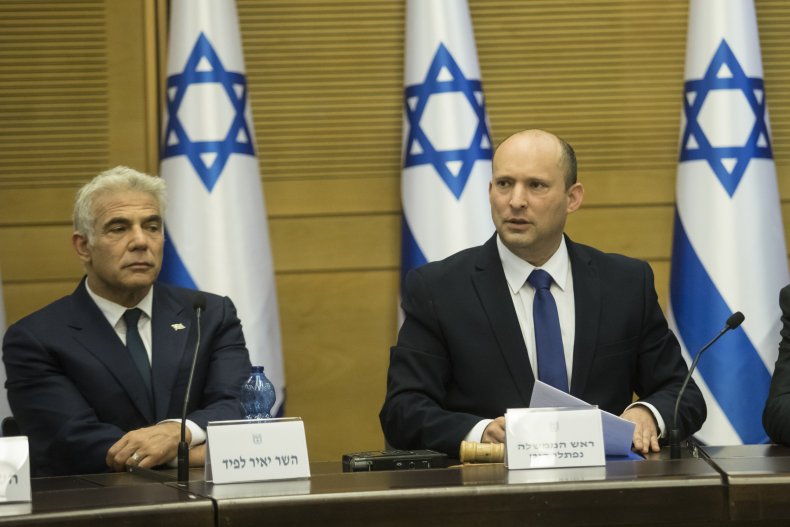Abraham Accords Nations Urge New Israel Government to Ease Off Palestinians
The new Israeli government and its Arab partners are expressing hope they can build on last year's historic Abraham Accords, even as fresh violence flares with Palestinians in East Jerusalem and the Gaza Strip.
The normalization deals signed last year by the United Arab Emirates, Bahrain, Sudan, and Morocco were a diplomatic coup for former Prime Minister Benjamin Netanyahu and former President Donald Trump.
Though both men are now out of office, Abraham Accords signatories have told Newsweek they expect the new coalition—led by far-right Prime Minister Naftali Bennett and Foreign Minister Yair Lapid—to build on the deals that stunned the world, outraged the Palestinians, and cemented decades of behind-the-scenes cooperation despite historic Arab-Israeli enmity.
Lapid—who will take over from Bennett as prime minister in two years if the coalition survives—said Tuesday: "We need to continue the development that started with the Abraham Accords. To work to strengthen the peace with the Gulf States, with Egypt and with Jordan."
He added: "We will work to sign agreements with more countries in the region and beyond. It's a process, it won't happen in a day, but the Foreign Ministry will coordinate those efforts."
Abraham Accords and normalization deal nations have echoed Lapid's commitment, despite their recent concerns over Israeli state violence against Palestinians in East Jerusalem and the Gaza Strip.
Indeed, only a day after the new government was sworn in, Israeli police were criticized for attacking and arresting scores of Palestinians protesting a controversial far-right flag march through annexed East Jerusalem, where attendees chanted "death to Arabs."
The Hamas militant group that controls the Gaza Strip sent incendiary balloons across the border to protest the march, setting fires in southern Israel, after which the Israel Defense Forces launched fresh airstrikes into the besieged enclave. Gazans also clashed with IDF troops along the frontier, with at least one Palestinian shot.
The UAE congratulated Bennett and Lapid on Monday, the country's Foreign Ministry tweeting that it is looking forward to "working together to advance regional peace, strengthen tolerance and coexistence, and embark upon a new era of cooperation in technology, trade, and investment."
Mohamed Al Khaja, the UAE's ambassador to Israel, told Newsweek: "The UAE is proud of the ground-breaking Abraham Accords, which represent a significant opportunity to advance peace and prosperity in the region, particularly given the benefits of political, economic, health, and cultural cooperation.
"We are already seeing these benefits play out in terms of direct air and telecommunications links, tourism and business growth, joint cooperation in science, technology and medicine, and diplomatic ties including the exchange of ambassadors and the opening of embassies.
"We expect this co-operation to continue to deepen over time.
"The spirit of the Accords is based on the importance of diplomatic solutions and the de-escalation of conflict to create an environment of stability and engagement in development, as we believe that building bridges is the only viable route towards achieving lasting peace, stability, and prosperity."
A Bahraini government spokesperson told Newsweek that the Gulf kingdom was likewise looking towards closer cooperation.
"The bridges built over the past few months have been built on a solid foundation where both countries have taken it upon themselves to bring the Abraham Accords to fruition," the spokesperson said.
"While there was a change in the American administration, the U.S. has been unfaltering in its support for the advancement of the Abraham Accords.
"In the same way, we have no doubt that Bahrain and Israel will continue the same development of improved relations between the governments and our peoples."
A Moroccan government spokesperson said December's trilateral agreement "is between countries, Morocco, the United States and Israel; not individuals or political parties and does not depend on the 'administration of the day.'
"It is a legally binding instrument. It sets a certain number of commitments by all the three countries." Now, the spokesperson said, is the time to "work towards some confidence-building measures."
"The establishment of full diplomatic, peaceful, and friendly relations is in the common interest of both countries and will advance the cause of peace in the region, improve regional security, and unlock new opportunities for the whole region," they said.
"Our trilateral agreement is a great start. It is a roadmap for cooperation politically, diplomatically, economically. A road map that each of the three must respect, protect and promote."
The spokesperson added: "We have reestablished formal relations with Israel on the basis of a conviction...this conviction is shared by all Israelis."

The Sudanese government did not respond to Newsweek's request for comment on the new Israeli government and the future of its normalization deal. But a report by Sudan's Kan public broadcaster said this week that Khartoum is not satisfied with the outcomes of the normalization deal.
Senior government sources reportedly told Kan that the U.S. has not fulfilled its promise of significant investment in agriculture and technology projects; money that officials reportedly believe would help them sell the deal to a skeptical population.
All the signatories got something from the normalization deals. Indeed, critics of the agreements—the Palestinians among them—dismissed the accords as bribery, accusing the signatories of selling out pan-Arab and Palestinian interests for financial or political gain.
The UAE stands to benefit from closer economic and tech ties to Israel and is also in line to receive a windfall of new American military equipment. Among this is the cutting-edge F-35 stealth fighter. The UAE would be only the second Middle Eastern nation to field the fighter after Israel.
Bahrain is also looking for a financial and tech windfall from formalizing ties with Israel. Observers have also suggested that Bahrain will seek access to modern Israeli air defense technology, something Israel has signaled its openness to.
With President Joe Biden's administration looking to disengage from the Middle East in favor of Asia, the accords also cemented American military support for both Gulf states, which already host a network of important U.S. military facilities. Closer engagement could also help offset liberalizing demands of more progressive Democratic lawmakers.
In return for its normalization deal with Israel, Sudan was taken off the U.S. State Sponsors of Terrorism List (SSTL), a designation that had blocked much-needed foreign investment and diplomatic assistance. The Sudanese transitional government—in power since hardliner Omar al-Bashir was deposed in 2019—made escape from the SSTL a central goal.
Morocco, meanwhile, won a key political concession for its normalization deal. The Trump Administration agreed to recognize Morocco's claim to the disputed Western Sahara territory in return. This gives Rabat the edge over the militant Polisario Front group, which has been fighting for autonomy in Western Sahara since the 1970s.
The Abraham Accords included an Israeli agreement to shelve its controversial plan to annex much of the Palestinian West Bank, a commitment that drew howls of condemnation from across the region. Regardless, the Palestinians framed the deals as a betrayal.
All the signatories condemned Israeli heavy-handed policing and military action during the most recent conflict in Gaza. The land ownership dispute in the East Jerusalem neighborhood of Sheikh Jarrah escalated into an attack on Palestinian protesters at the sacred Al-Aqsa Mosque, and later the days-long exchange of fire between IDF and Gaza militant factions.
The representatives who spoke with Newsweek expressed hope that the new government would be accommodating of Palestinians rights, the peace process, and the two-state solution, all of which Netanyahu was widely accused of undermining.
But many observers say Israel's continued expansion of illegal settlements and military occupation means the two-state proposal is already de facto defunct. A government led by Bennett is unlikely to revive it given his long history of far-right anti-Palestinian agitation.
The Israeli prime minister's office did not respond to Newsweek's request for comment.
It seems unlikely that the new government will walk back the kinds of policies that have prompted some human rights groups to accuse Israeli authorities of apartheid.
A source familiar with UAE thinking who did not wish to be named said the Emiratis would continue to push for Palestinian rights even while working closer with Israel.
"No one expected that this would be the catalyst for a comprehensive peace agreement in the short term," the UAE source said.
Both the government and the Emirati people, the source said, retain a backing of Palestinians that is "as intense a support as it ever was."
"The Emiratis have, over the years, put tens of billions of dollars into the Palestinian Authority," the source said. "There is no surprise they are frustrated with the lack of progress. They have no interest in doing anything that helps Hamas, the Muslim Brotherhood, or Iran, but they do want to find vehicles to be supportive of the Palestinian people."
The Emiratis "absolutely" hope the new government will ease pressure on the Palestinians, the UAE source explained: "That has been communicated very directly and consistently...Change in the Israeli government that's going to lower the temperature a little bit, take a longer-term view of what's possible, I think is welcome."
The Bahrain government spokesperson said: "Bahrain is committed to a peaceful foreign policy that spreads a culture of dialogue, and coexistence, consistent with the Kingdom's history and national character. The Arab region's interests are best met by engagement, cooperation, and understanding.
"Bahrain hopes Israel shares the urgency we do with the need to revive the peace process in the Middle East in order to reach a permanent political solution capable of achieving security and peace.
"One that restores the Palestinian people's legitimate rights to an independent state, with East Jerusalem as its capital, in accordance with international resolutions of legitimacy, the two-state solution, and the Arab Peace Initiative."

Morocco too, is clear that the new government should work towards a two-state solution and full Palestinian statehood, even though both Bennett and Lapid have dismissed such proposals in the past.
"Morocco has always insisted on the importance to refrain from any act likely to precipitate the region towards more tensions," the government spokesperson said.
"Unilateral actions only widen the rift between the two parties and jeopardize the chances to relaunch not only the peace process but also all trust-based initiatives to re-establish confidence-building measures between the parties."
King Mohammed VI, the spokesperson said, "firmly opposes any attempt to change the legal and historical status of Jerusalem and the Al-Aqsa Mosque, to undermine the serenity of the holy places, or the illegal eviction of residents."
The Moroccan spokesperson continued: "As we have stated both publicly and privately, the escalation of fighting and violence we have witnessed recently is the inevitable result of the stalemate in the peace process in the region, exacerbated by repeated violations against the people, and the proliferation of hate speech by extremist organizations from both sides."
There is "no other alternative" to a two-state solution and an "independent Palestinian state, sovereign and viable with Al-Quds-East as its capital within the borders of June 4, 1967," they said.
Biden and his team are expected to push harder for the new Israeli government to respect the two-state solution and curtail the worst human rights abuses against Palestinians. Bennett and Lapid have less international diplomatic clout than Netanyahu, so are perhaps more amenable to renewed efforts from the international community to revive peace talks.
But external pressure has done little to sway the situation on the ground. The new government might be more diverse, but both Bennett and Lapid will have veto power. Any controversial issues, among them the Palestinians, could be stuck in the status quo.
"It will be very hard to demand much from the government," former Israeli permanent ambassador to the United Nations, Danny Danon, told Newsweek. "I don't think we will see major changes."
The change in government might give Washington, D.C. more breathing room on other issues like the Iran nuclear deal—or Joint Comprehensive Plan of Action, which Israeli leaders are united against—but less so the Palestinian question.
Danon also suggested that Bennett and Lapid's past anti-Palestinian rhetoric might not cause the kind of friction some observers have suggested.
"People understand that in politics you make a lot of statements in different positions," Danon said. "I think that they will look at the concrete decisions and actions of the new government."
The Emirati source, however, said Bennett's rhetoric could cause problems. But the source noted that Netanyahu, too, was consistently dismissive of the Palestinians. "The fact that he has to have some restraint within a coalition government is encouraging because it does create an opportunity to have a conversation," they said of Bennett.
The most significant actions will be in domestic policy, not foreign, Danon added.
"Because of the structure of government—the fact that you have veto power for both sides, and that have different views represented in the government from the left to right—I think it would be easier for them to focus on domestic issues, economical and social issues, rather than dealing with foreign affairs," Danon told Newsweek.
For Israel's new friends in the Arab world, that is good news. "You have overwhelming support for the Accords and for normalization with the moderate Arab countries," Danon said. "I don't see a problem there. But any other issue regarding the Palestinians—I think it will be very hard to move forward."
Palestinian officials have continued speaking out against the Abraham Accords, citing the latest violence as proof that no peace in the Middle East is achievable without settling the Palestinian question.
Palestinian Ambassador to the U.K. Husam Zomlot told a Chatham House thinktank event this week: "Addressing the Palestine issue is a priority. Treating it as a conflict management exercise does not work. This has been the case for a long time. Not addressing root causes is no longer an option."
The ambassador—who previously served as the head of the Palestinian mission in Washington, D.C. which was closed by the Trump Administration—added: "Israeli power has its limits. Israel cannot impose a solution on the Palestinians."
"On the Israeli side...we need a sea of change," Zomlot said, discussing the new government. Palestinians, he said, should be its top priority: "No normalization agreement with far-flung countries will change that fact."
Zomlot suggested that the Abraham Accords and normalization deals have done little to change the regional balance of power, despite observers touting the agreements as a geopolitical shift away from the Palestinians.
"We are absolutely certain about Arab support," Zomlot said, noting continued public backing from Egypt—despite its close relationship with Israel and its role in the embargo of Gaza—Jordan, and Saudi Arabia.
Meanwhile, the killing of Palestinians in Gaza, expansion of Israeli West Bank settlements, evictions, and arrests go on, regardless of the appeals of Abraham Accords and normalization nations.
Last year as the agreements were signed, the Israeli government also approved the highest number of new West Bank settlements since at least 2012, according to the Israeli Peace Now group.
Netanyahu may have walked back his threat to annex much of the West Bank, but Israel's stealthy absorption of internationally-recognized Palestinian land goes on.
"We've seen what is happening in Gaza and everywhere," Zomlot said. "Anybody who argues that these Accords have really helped Israel cool down needs to look at the numbers."


